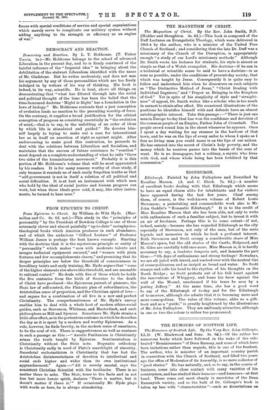Prom Epicurus to Christ. By William de Witt Hyde. (Mac-
millan and Co. Os. 6d. net.)—This study in the " principles of personality" by the President of Bowdoin College is one of those extremely clever and almost painfully "up-to-date" metaphysico- theological books which America produces in such abundance, and of which the audacious " Gifford Lecture " of Professor William James is perhaps the best known example. Starting with the doctrine that it is the mysterious principle or entity of " personality " which makes " men with moderate talents and meagre technical equipment succeed," and " women with plain features and few accomplishments charm," and premising that its deeper principles are below the threshold of consciousness in hereditary taints and early training, Mr. Hyde argues that " some of the higher elements rise above this threshold, and are amenable to rational control." He deals with five of these which he holds the five centuries from the birth of Socrates to the death of Christ have produced—the Epicurean pursuit of pleasure, the Stoic law of self-control, the Platonic plan of subordination, the Aristotelian sense of proportion, and the Christian spirit of love— and argues for a combination of all five in a new and perfect Christianity. The comprehensiveness of Mr. Hyde's survey enables him to deal with a whole host of modern ethico-social guides, such as Stevenson, Whitman, and Maeterlinck, and such philosophers as Mill and Spencer. Sometimes Mr. Hyde strains a little after effect, as in the portentous sentence in which he describes the day as it is spent by a modern and worthy Epicurean. As a rule, however, he finds brevity, in the modern sense of smartness, to be the soul of wit. There is suggestiveness as well as neatness in such a passage as this :—" Ascetic Puritanism is Christianity minus the truth taught by Epicurus. Sentimentalism is Christianity without the Stoic note. Dogmatic orthodoxy is Christianity sadly in need of Plato's searchlight of sincerity. Sacerdotal ecclesiasticism is Christianity that has lost the Aristotelian disinterestedness of devotion to intellectual and social ends higher and wider than its own institutional aggrandisement." Again :—" All is merely mental, says the consistent Christian Scientist with the toothache. There is no matter there to ache. The Stoic, truer to the facts and in not less but more heroic spirit, declares There is matter, but it doesn't matter if there is.'" If occasionally Mr. Hyde plays with words as here, he is always stimulating.






















































 Previous page
Previous page